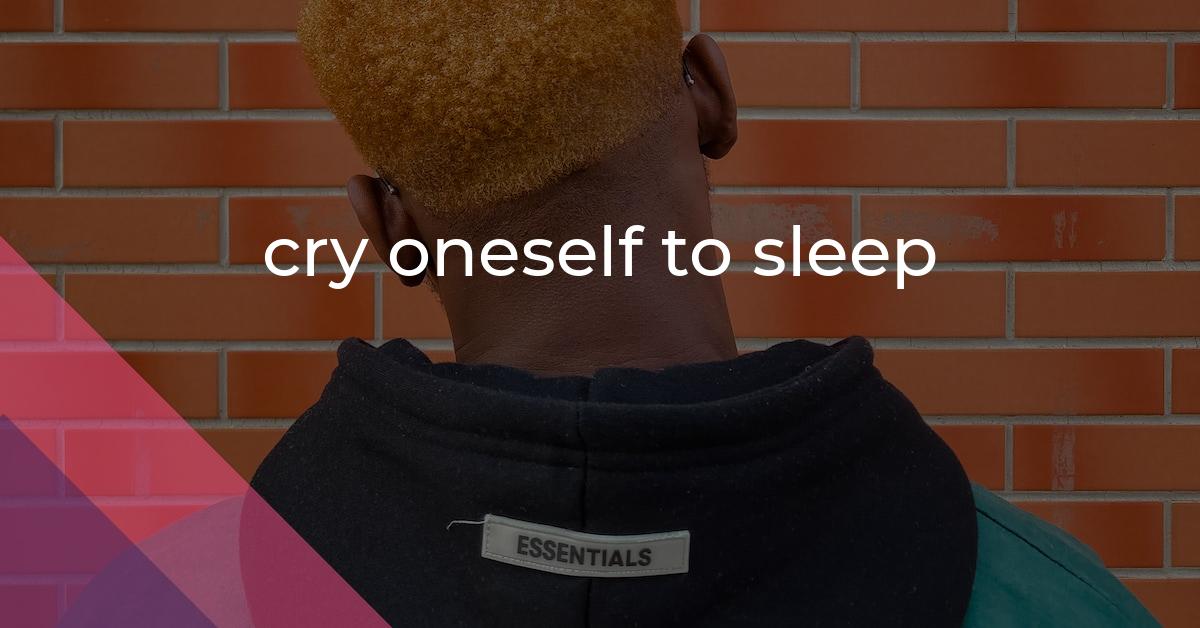cry oneself to sleep: Idiom Meaning and Origin
What does ‘cry oneself to sleep’ mean?
The idiom "cry oneself to sleep" means to cry so much that one falls asleep while crying. It is usually used to imply extreme sadness or emotional pain.

Idiom Explorer
The idiom "reduce someone to tears" means to make someone cry or become extremely upset.
The idiom "let oneself go" means to stop making an effort to maintain one's appearance or behavior, often resulting in a decline or deterioration in one's physical or emotional state.
The idiom "knock oneself out" means to exert a lot of effort or work extremely hard. It is often used to encourage someone to do something with great enthusiasm or without holding back.
The idiom "keep someone up at night" means to cause someone to feel worried, anxious, or preoccupied, preventing them from sleeping peacefully.
The idiom "keel over" means to suddenly fall over, usually due to extreme tiredness, illness, or shock. It can also be used figuratively to describe a sudden collapse or failure of something.
An idiom used to describe someone who is in an emotional or mental state of extreme agitation, distress, or confusion.
The idiom "hang low" means to appear sad or dejected, often with drooping body posture or a downcast expression.
The idiom "go to sleep" means to fall asleep or to begin the process of sleeping. It is often used to encourage someone to relax and rest, or to indicate that someone is not paying attention or is disinterested in a particular topic or situation.
The idiom "fox sleep" refers to a false sense of security or being naive. It originates from the habit of foxes to feign sleep, deceiving their prey. The idiom implies the danger of underestimating someone or something.
The idiom "forget oneself" means to lose control of one's emotions or behavior, usually in a way that is unusual or inappropriate for the situation.
The Lachrymose Dreamer
The idiom "cry oneself to sleep" is a commonly used expression in the English language, denoting extreme sadness or disappointment leading to tears before falling asleep. This idiom refers to the act of shedding tears while attempting to find solace in slumber. It implies a prolonged period of emotional suffering, often leading to restless nights and tearful episodes at bedtime.
The phrase "go to sleep" is a related idiom that can be used to contextualize the concept of crying oneself to sleep. While "go to sleep" refers to the act of falling asleep, it is used here to emphasize the difficulty and emotional turmoil associated with finding sleep when one is in a state of extreme sadness or heartache. In such cases, crying becomes a way to release pent-up emotions before attempting to find rest.
The idiom "reduce someone to tears" is another related expression that can shed light on the emotional impact of crying oneself to sleep. This phrase is used to describe a situation or event that has a profound emotional effect on someone, causing them to cry. When someone is reduced to tears, it implies a deep sadness or disappointment that overwhelms their emotions and brings them to the point of crying.
These related idioms provide insight into the emotional journey of an individual who is experiencing deep sadness or heartbreak and resorts to crying themselves to sleep as a means of emotional release. The act of crying before falling asleep becomes a way to process and cope with intense emotions, allowing for a cathartic release that may eventually lead to healing and acceptance.
It is important to understand that crying oneself to sleep is a deeply personal experience, as the emotions and circumstances leading to such a state vary among individuals. Some may cry themselves to sleep due to the loss of a loved one, a painful breakup, or a long-standing disappointment. The underlying theme, however, remains the same - the need for emotional release and the search for solace in the comfort of sleep.
In literature, the idiom "cry oneself to sleep" has been used to evoke profound emotion and convey a sense of deep despair. Writers and poets often employ this expression to depict the raw vulnerability and heartache that accompanies personal tragedies and emotional upheaval. By using this idiom, writers can connect with readers on a visceral level, tapping into the universal experience of navigating through life's ups and downs.
Furthermore, the idiom "cry oneself to sleep" has become ingrained in popular culture, finding its way into movies, television shows, and everyday conversations. Its relatability and descriptive power make it a powerful tool for expressing and understanding the complexities of human emotions. Whether in a heart-wrenching scene in a film or a heartfelt conversation between friends, the idiom resonates with individuals who have experienced or witnessed the depths of emotional pain.
The impact of crying oneself to sleep is not limited to the individual experiencing it but can also affect those who witness it. When someone is reduced to tears, it can elicit feelings of empathy and compassion in others. They may feel a sense of helplessness or a desire to offer comfort and support to the person going through the emotional turmoil. The act of crying oneself to sleep thus becomes a shared experience, highlighting the universal nature of emotional vulnerability.
The idiom "cry oneself to sleep" captures the essence of deep emotional distress and the need for emotional release. It is a relatable expression that conveys the universal experience of navigating through sadness, heartache, and disappointment. This idiom, along with related expressions such as "go to sleep" and "reduce someone to tears," offers insight into the emotional journey of individuals and the power of language to express and understand our shared human experiences.
Example usage
Examples of how the idiom cry oneself to sleep can be used in a sentence:
- She couldn't handle the heartbreak, so she cried herself to sleep every night.
- After a difficult day, he found solace in tears and cried himself to sleep.
- The news was so upsetting that the child cried herself to sleep, seeking comfort in dreams.
More "Emotions" idioms



